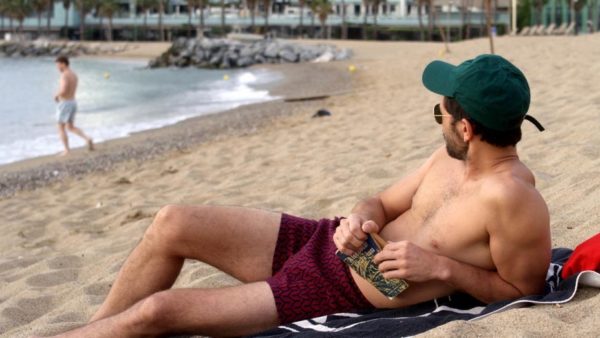
What happens when a casual vacation hook-up turns into something more meaningful and unexpected? That’s the basic premise behind End of the Century, Argentinian filmmaker Lucio Castro’s debut feature.
The film follows Ocho (Juan Barberini), a wannabe NY poet vacationing in Barcelona. Castro, also the screenwriter, adopts a languid pace early on as we follow Ocho through his initial few days: settling into his Air BnB, watching the crowds pass by from his balcony, dining solo and, when the mood strikes, perusing Grindr. At the beach, he spots a guy who catches his eye and follows him into the water, but Javi (Ramón Pujol) disappears shortly thereafter.
Later, in a moment of odd coincidence, the pair meet up outside of Ocho’s apartment and spend an intimate afternoon together. When Javi messages that evening that they should grab food and hang-out, it feels like End of the Century is channeling Weekend or Paris 05:59: Théo & Hugo: get the sex out of the way first and let the intimacy follow organically. It doesn’t hurt that Barberini and Pujol have solid sexual chemistry and the banter that is interspersed amongst the sex and afterwards feels both playful and authentic.
It is only when they are hanging out over cheese and wine in front of a gorgeous sunset that Castro drops a fascinating truth bomb into the proceedings. Ocho jokingly references that he feels as though they’ve met before and Javi agrees…because they have: 20 years earlier. At this point End of the Century jumps back to uncover their previously undisclosed relationship and make even deeper meaning out of small details of their interactions (a KISS t-shirt, how they feel about having children, a mutual friend in Mía Maestro’s Sonia, etc).
Castro’s camerawork is deliberately unobtrusive: he frequently opts for long takes that allow his actors’ performances room to breathe, except in focalized moments of urgency (when Ocho swims, a random cruising encounter in the woods, an impromptu dance break) when he adopts a more active handheld approach. As a directorial choice, this helps to craft a naturalistic intimacy that helps draw audiences into the burgeoning (or is it continuing?) love affair between the men.
Unfortunately End of the Century relies on two key time disruptions to tell its story and it is here that the film is less successful. Barberini and Pujol can both easily pass for thirty-something, but no effort is made to visually distinguish them when the film jumps back to 1999. Ocho’s hairstyle and facial hair remains the same in both timelines and Javi looks identical; the only effort to code the actors as “younger” is that Ocho wears a baseball tee and a hat for a little while.
Both actors do modulate their performances accordingly (Ocho appears wiser in the 2019 sequences, whereas Javi is more in control in the past), but between their near-identical looks and the more problematic lack of visual signifier to denote the time jump, there are two long stretches of time when it is unclear when the film is taking place.
This artistic choice by Castro ultimately clouds his vision. Rather than immersing audiences in the drama of a cyclical relationship, the less-than-clear time jumps create pockets of confusion. It is frustrating because the rest of the film is a well-crafted exploration of how chance encounters have the capacity to dramatically alter the course of personal histories, but these stretches undermine the capacity of audiences to fully invest in the narrative.
End of the Century is an intimate (and yes, occasionally flesh-baring) gay drama with a pair of strong lead performances, but it’s not quite as satisfying as it could have been.
Rating: 3.5/5
Frameline is the world’s longest-running and largest showcase of queer cinema. Frameline43, the San Francisco International LGBTQ+ Film Festival, takes place June 20-30, 2019 in San Francisco, Berkeley, and Oakland. This year’s slate includes 59 films screening for the first time in the US, including 22 world premieres, 8 international premieres, 12 North American premieres, and 17 US premieres. The lineup also contains a record-breaking 22 first narrative features. Find out more information here.